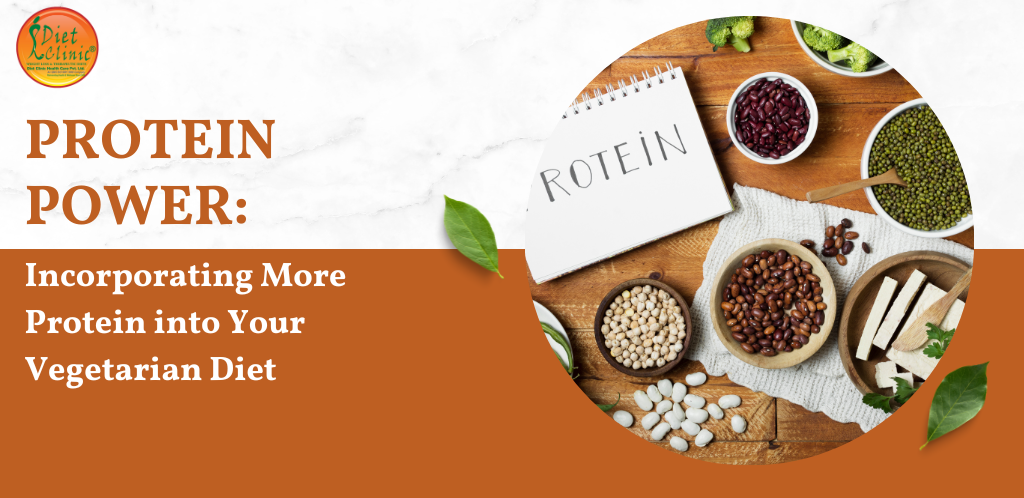
Dietician Sheela Seharawat
Protein Power: Incorporating More Protein into Your Vegetarian Diet
Protein is often referred to as the building block of life, and for a good reason. It plays a crucial role in various bodily functions, including the growth and repair of tissues, the production of enzymes and hormones, and the maintenance of a strong immune system. When we think of protein-rich diets, our minds often turn to animal-based sources like meat, poultry, and fish. However, vegetarian diets can also be rich in protein if planned thoughtfully.
In this blog, I, Dietician Sheela Seharawat, will guide you through the world of plant-based protein, offering tips and insights on how to incorporate more protein into your vegetarian diet for a healthier and balanced lifestyle.
The Importance of Protein in a Vegetarian Diet:
Vegetarian diets are known for their numerous health benefits, including a lower risk of heart disease, high blood pressure, and certain types of cancer. However, it's essential to ensure that you're meeting your protein needs, especially if you follow a strict vegetarian or vegan diet. Protein deficiency can lead to muscle loss, fatigue, and compromised immune function.
Adequate protein intake is particularly important for vegetarians because plant-based proteins may be less digestible or complete compared to animal-based sources. However, with some knowledge and planning, you can easily meet your protein requirements through vegetarian sources.
Top Vegetarian Protein Sources:
Legumes: Legumes, such as lentils, chickpeas, and black beans, are excellent sources of protein. They are also rich in fiber, which aids in digestion and helps you feel full and satisfied.
Tofu and Tempeh: Tofu and tempeh are soy-based products that are versatile and protein-packed. They absorb the flavors of the dishes they are cooked in, making them great additions to various recipes.
Nuts and Seeds: Almonds, peanuts, chia seeds, and hemp seeds are protein-rich options. They also provide healthy fats, vitamins, and minerals.
Whole Grains: Whole grains like quinoa, farro, and bulgur are not only excellent sources of protein but also provide essential nutrients like fiber and iron.
Dairy and Dairy Alternatives: Dairy products like Greek yogurt and cottage cheese are rich in protein. If you're following a vegan diet, opt for fortified dairy alternatives like almond milk or soy yogurt.
Eggs: If you're an ovo-vegetarian, eggs are a fantastic source of complete protein, providing all the essential amino acids your body needs.
Tips for Incorporating More Protein into Your Vegetarian Diet:
Balanced Meals: Ensure that your meals include a balance of carbohydrates, protein, and healthy fats. For example, a chickpea salad with vegetables and a tahini dressing or a tofu stir-fry with brown rice can make a well-rounded meal.
Choose Whole Foods: Opt for whole, unprocessed foods whenever possible. Processed vegetarian options may contain added sugars, unhealthy fats, and artificial ingredients.
Snack Wisely: Snack on protein-rich options like Greek yogurt, mixed nuts, or hummus with carrot sticks to keep your energy levels stable throughout the day.
Experiment with Plant-Based Proteins: Don't be afraid to try new protein sources like seitan (wheat gluten) or edamame (young soybeans) in your recipes. They can add variety to your meals.
Combine Complementary Proteins: Many plant-based proteins are incomplete, lacking one or more essential amino acids. To ensure you get a complete protein profile, combine different protein sources throughout the day. For example, pair beans with rice or whole wheat bread with peanut butter.
Explore Meat Alternatives: There is a growing market for meat alternatives made from plant-based sources like soy, peas, and mushrooms. These products can be used as substitutes in traditional meat dishes.
Consider Protein Supplements: If you find it challenging to meet your protein requirements through food alone, consider adding a high-quality protein supplement to your diet. Consult with a dietitian or nutritionist to determine the right supplement for your needs.
Sample Day of a High-Protein Vegetarian Diet:
Here's a sample meal plan to help you visualize how to incorporate more protein into your vegetarian diet:
Breakfast:
Scrambled tofu with spinach and cherry tomatoes.
Whole-grain toast with almond butter.
A serving of fresh fruit, like a banana or berries.
Lunch:
A quinoa and black bean salad with mixed vegetables and a lime-cilantro dressing.
A side of Greek yogurt or a dairy-free alternative.
Afternoon Snack:
A handful of mixed nuts and seeds.
Sliced cucumber and bell pepper with hummus.
Dinner:
Lentil and vegetable stew served with brown rice or whole-grain bread.
A side salad with leafy greens and vinaigrette dressing.
Dessert (Optional):
A small serving of Greek yogurt with honey and sliced almonds.
Incorporating more protein into your vegetarian diet is not only achievable but also essential for your overall health and well-being. By diversifying your protein sources, planning balanced meals, and being mindful of your nutritional needs, you can enjoy all the benefits of a vegetarian diet while ensuring you meet your protein requirements. Remember that every small change towards a higher protein intake contributes to a healthier, more vibrant you. Start today, and embrace the power of plant-based protein for a more balanced and fulfilling lifestyle.










